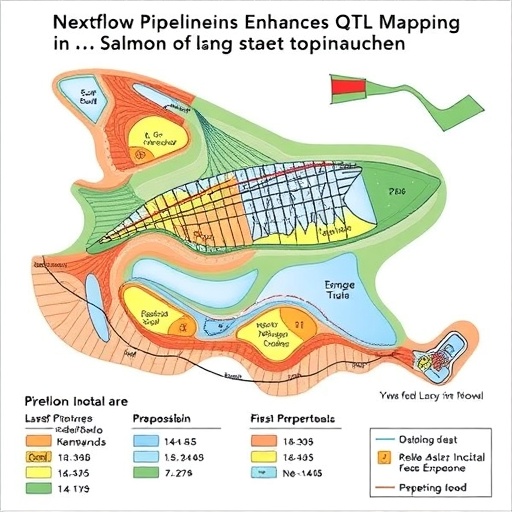In the realm of genomics, the burgeoning field of molecular quantitative trait loci (QTL) mapping has ushered in new methodologies that hold promise for advancing our understanding of complex genetic traits. A recent study led by Nguyen et al. introduces a groundbreaking Nextflow pipeline designed for QTL mapping within the context of small sample size datasets, a notable challenge that has long hindered genetic research.
The research, published in BMC Genomics, tackles the pressing issue of analyzing small datasets when attempting to discern genetic influences on traits. Traditionally, larger datasets have dominated genetic studies, but such resources are not always attainable. Nguyen and colleagues present a compelling narrative around their innovative approach, emphasizing how the Nextflow pipeline can facilitate comprehensive QTL analysis even when dealing with limited samples, particularly in the context of aquatic species like the Atlantic salmon.
The detailed design of the Nextflow pipeline is a significant factor contributing to its versatility and efficiency. It encompasses a series of computational steps that streamline data processing, thereby optimizing performance while maintaining accuracy. This structure allows researchers to engage in robust genomic analyses without the overhead typically associated with larger sample sizes. In leveraging a cloud-based framework, the Nextflow pipeline also ensures accessibility, enabling researchers from varied backgrounds to utilize advanced genomic tools.
The paper elegantly captures the technical intricacies of the QTL mapping process. At its core, mapping QTL requires the identification of chromosomal regions closely associated with phenotypic traits. With a demonstrated application in Atlantic salmon, the researchers employ a sophisticated array of statistical methodologies and computational models to pinpoint the loci related to traits of interest, such as growth rate and disease resistance. The implications of this work are profound, not only for salmon aquaculture but also for broader genetic research paradigms.
One of the paper’s notable highlights is the use of single nucleotide polymorphisms (SNPs) within the Nextflow pipeline, which shallows the gap between sequence variation and observable traits. By effectively harnessing SNP data, the authors provide a comprehensive overview of how genetic variations correlate with phenotypic expressions. This approach is pivotal in narrowing down candidate genes that may contribute to desired traits in Atlantic salmon, thereby accentuating the pipeline’s practical applicability.
Scalability is another key feature of the Nextflow pipeline. This attribute is particularly crucial for research teams operating in environments where computational resources may be limited. By employing a parallel computing framework, it can dynamically allocate resources according to the available dataset size. Such flexibility enhances the research capabilities of institutions whether they are dealing with thousands of samples or just a few, thus democratizing access to high-quality genomic analyses.
Furthermore, Nguyen et al. advocate for the reproducibility of scientific research through their pipeline, a cornerstone principle in genomics. As scientific middle grounds move towards data transparency and reproducibility, the Nextflow framework provides detailed logs and version control which researchers can refer back to when attempting to replicate results or build upon existing data. This focus on reproducibility can significantly bolster the credibility of genetic research findings in the long-term.
The study also sheds light on the eco-genomic implications of their findings. With a focus on Atlantic salmon, a species integral to both ecological balance and human consumption, the potential applications of a precise QTL mapping strategy are quite extensive. Enhancing traits such as disease resistance through genetic insights could lead to more sustainable aquaculture practices, drastically impacting the fishing industries and contributing to food security amidst growing populations.
Moreover, the authors underscore the social significance of such advancements. In a world increasingly driven by biotechnological progress, the ability to map genetic traits accurately paves the way for novel breeding programs tailored for desired characteristics. This could ultimately lead to healthier fish populations, reduced reliance on antibiotics, and improved overall ecosystem health.
It’s important to note the collaborative spirit that permeated this research. The inclusion of multiple authors with varied expertise emphasizes the interdisciplinary approach necessary for tackling complex genetic inquiries. Combining the fields of bioinformatics, computational biology, and traditional genetics ensures that multifaceted problems are addressed holistically, providing a template for future collaborative efforts.
As the publication continues to garner attention, the implications extend beyond just fish farming or genetics. The methodologies discussed could find applications across a spectrum of agricultural domains including crops and livestock, driving forward a more data-driven approach to animal husbandry and plant breeding. The dynamic landscape of genetic research necessitates such innovations, serving as a beacon for upcoming research endeavors.
In conclusion, Nguyen et al.’s work represents a significant advancement in the field of molecular QTL mapping. By articulating the potential of the Nextflow pipeline, the study serves as a critical resource for both current and future research aiming to overcome the challenges associated with small sample sizes in genetic studies. The fusion of technology with biological inquiry embodies the future of genomics, reaffirming the need for continued exploration and innovation in understanding the genetic blueprint of complex traits.
This comprehensive analysis not only opens new avenues in genetic research but also illustrates a clear path toward practical solutions within ecological and agricultural contexts, broadening the scope of impact that such research can have on global challenges.
Subject of Research: Molecular quantitative trait loci mapping in small sample size datasets with an application in Atlantic salmon.
Article Title: A nextflow pipeline for molecular quantitative trait loci mapping in small sample size datasets with an application in Atlantic salmon.
Article References:
Nguyen, D.T., Sandve, S.R., Lien, S. et al. A nextflow pipeline for molecular quantitative trait loci mapping in small sample size datasets with an application in Atlantic salmon. BMC Genomics 26, 1070 (2025). https://doi.org/10.1186/s12864-025-12302-5
Image Credits: AI Generated
DOI: https://doi.org/10.1186/s12864-025-12302-5
Keywords: Molecular QTL mapping, Nextflow pipeline, Atlantic salmon, small sample sizes, genomic analysis, SNPs, reproducibility, ecological impact.




